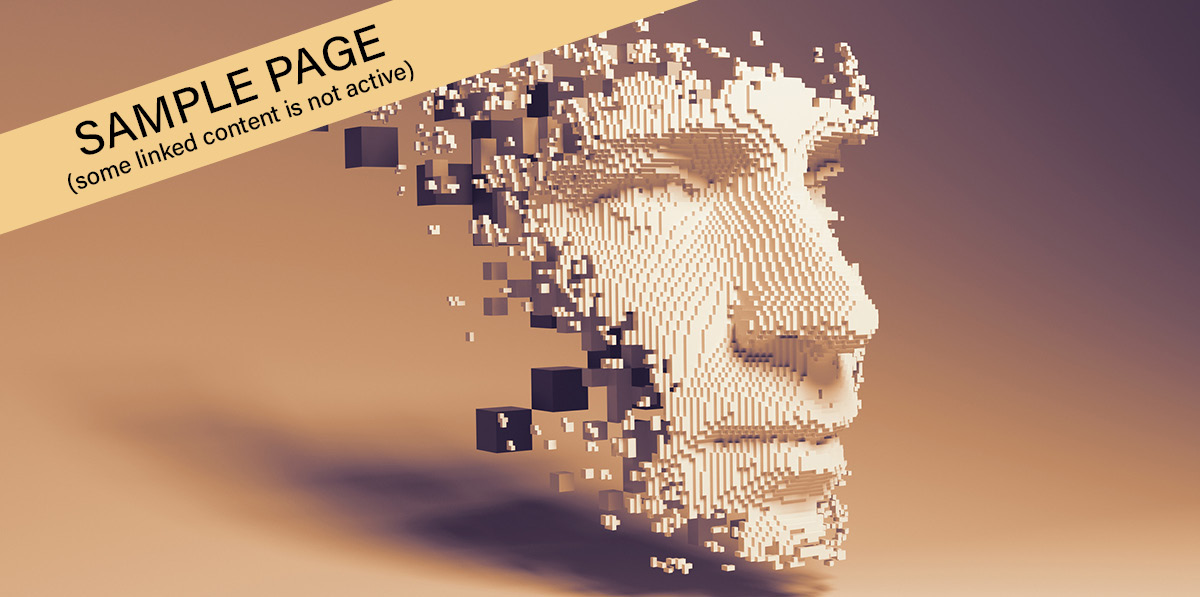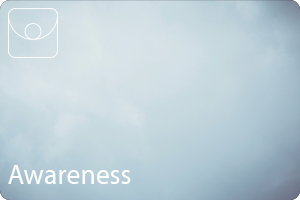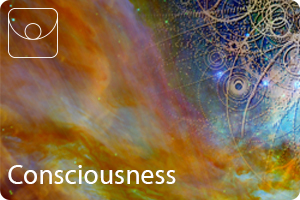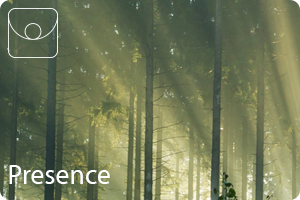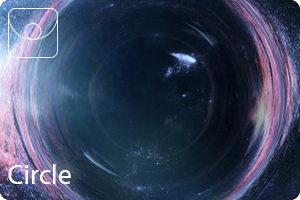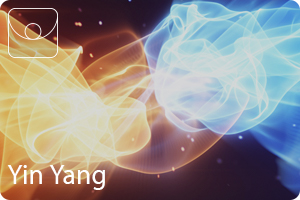Sample Essay Page
CHAPTER 1: IDENTITY - CONCEPT 1: IDENTITY
"No one knows more about you than you." - Armand Bytton
What is Identity?
Imagine that you are in a clear and endless space. A sheet of translucent fabric hovers within it, stretched flat. Small spheres, every one of them different, begin to float down from the infinity above, and gently come to rest on the sheet. As each sphere lands, it creates a unique dent on the fabric, and the impact of all the spheres together creates a constant rippling in the sheet, an endless dance of interacting waves.
Now imagine that you are one of these spheres. You roll one way and another, become lighter and heavier, contract and expand, glow with different colors – and with each choice your dent adapts and changes with you. Because of the shared fabric you rest on, your shifting affects the other spheres and their shifting affects you. As you recognize this, you can now make new relational choices as you interact with the environment and the effects that your choices have. The ways that you behave and express yourself is your “i”-dent in this particular field of space and time. Here, your creation of i-dent-ity can be an evolving, playful flow of events and choices within the possibilities that this connected space offers.
However, such freedom to create your own interactions, meanings, and identity is often not part of modern societies. Instead of being offered a field of collaborative interplay, you are told that to be accepted and have access to basic nourishment and protection, you must behave a specific way within a strict set of limited options. You are also typically told that there is a scarcity of everything – ideas, choices, resources, and acceptable needs – so you must either agree to the offered, often insufficient, rations or take from others to increase your share. Your expressions, needs, and opportunities are all dictated by the restraints of a closed system that rigidified long before you were born into it.
Being excluded from identity-making and needs-fulfillment processes, being told precisely who and how you are permitted to be, can generate deep sensations of betrayal, alienation, fear, abandonment, and suffering. You can feel unseen, unaccepted, and unvalued. Your most basic safety and freedom can feel completely compromised.
However, even within these conditions it is possible to recover the ability to create your own identity and meanings in life. It is possible to explore the question of “Who am I?”, and do so without abandoning or destroying the system around you. You can choose which elements of your environment to fully engage with and build upon, and you can choose to compassionately release the ones you don’t want to collaborate with. You can learn to freely create, freely express, and be the full flow of who you are, in harmony with all that is around you. You can reclaim your infinity, and live not from holes but from evolving wholeness.
Key Words
- Imagine
- Freedom
- Expression
- Creation
Discussion or Journal Questions
- What is something you really like about yourself?
- What is a skill you have that you enjoy sharing with others?
Practice
- Notice the ways that you do common things differently from other people you know.
Experience
Listen to these audio recordings while watching the video in full screen mode. Notice what emotions, feelings, sensations, thoughts, images, and memories arise during the experience. Also try listening with your eyes closed, or breathing or moving in different ways, and notice the differences these create. (Please use quality headphones or speakers for a full experience.)
More from Armand on this Topic
See additional quotes on this topic and others in the ever-growing Methodology Wiki (included in your Course membership).
- There is a you that is universal, and that universal you is always there. It utilizes whatever is created by the environment, by the relational field, by the culture, to express itself. That sense of I am is like wearing clothes; your clothing, your universal frequency.
- Identity is the vehicle through which we are able to come together and do things in this world. It’s like having a body. Without a body it would be difficult for anyone to have the interactions in this world that we’re having right now. The same thing happens when you structure your inner self. You create a mask, like a body that allows you to function within the given socio-cultural milieu. The problem is that if you’re not taught about identity making then there is a sense that this mask is all there is. That is not true. Identity goes way beyond that.
- If your environment doesn’t know how to hold your uniqueness and how to maintain it, it forces you to be something that you’re not. Then the resulting identity structure is geared towards the outside, always depleting itself and creating a false sense of safety. You are constantly creating something that is not real, that is not you.
- Just be yourself, otherwise you'll be somebody else, and you may not like it. Then you have to be somebody else, and then somebody else, and that's how you get lost in the mirror. Then you're in a million mirrors and you don't know which one is the real one until you start breaking it; but there are too many of them. So what do you do? Close your eyes! People get into this work because they want to find themselves, and then they still try to define themselves based on something that is outside of themselves.
To access these audio recordings, visit the Movie Night and New Year's Eve community page.
- Topic-specific links coming soon; the full archive is available now.
To access these videos, as well as the video archive and this month's live webinars, please open a webinar subscription (free for your first 30 days).
- Topic-specific links coming soon; the full archive is available now.
Additional Perspectives
Share your own by sending them to: info@momentsofawe.org or through this form, with the subject "Intro Course Share". For tips on how to find even more perspectives, see the And Even More tab below.
What is Identity? by James Fearon (read/download on MoA or original source)
- The Three Christs of Ypsilanti by Milton Rokeach
- Hearing Voices by Brian Andreas
More books are available in the MOA Store (open to the public).
Clip Art Identity Game
Materials: Gather magazines of different kinds, as well as two sheets of blank paper and scissors for each person playing the game.
- Playing solo: Clip out words and phrases from each magazine that you feel describe you, as well as words that you think others would use to describe you, and keep them in two separate piles. First arrange the words you chose to describe yourself on one sheet of paper and notice what feelings and thoughts arise as you look at them. Next, the arrange the words you think others would have chosen on the second sheet of paper and notice what feelings and thoughts arise as you look at them.
- Playing with others: Clip out words and phrases from each magazine that you feel describe you, as well as ones that you feel describe the other players. Each player first arranges the words they chose for themselves on one sheet of paper and shares aloud what they are as well as the feelings and thoughts that arise as they look at them. Next, players hand out the words they found for each other. Each player then arranges the words others chose for them on the second sheet of paper, and shares aloud what they are as well as the feelings and thoughts that arise as they look at them.
More games are available in the MOA Store (open to the public).
- Can I hide my identity? by Tanni Koensx

- Folk Wisdom by Pavel Kuragin

Click image to enlarge.
For this Chapter: Who Am I? by Kim Eng (Start video at 4min 19 sec)
More movies are available in the MOA store (open to the public).
More music is available on our Spotify channel (open to the public).
- Revelation Must Be Terrible by David Whyte
More poems are available in the ever-growing Poetry Wiki (included in your Course membership).
- “In the social jungle of human existence, there is no feeling of being alive without a sense of identity.” - Erik Erikson
- “Identity cannot be found or fabricated but emerges from within when one has the courage to let go.” - Doug Cooper
- “Unlike a drop of water which loses its identity when it joins the ocean, man does not lose his being in the society in which he lives. Man’s life is independent. He is born not for the development of the society alone, but for the development of his self.” - B.R. Ambedkar
- Identity by Alireza Salehi
- The Art of Being Yourself by Caroline McHugh
Looking for more perspectives? We'll keep adding them as we find them and as you share them -- so please join the hunt!
Some of our favorite resources are:
|LS|this list is available to course members|RS|
Discussion Recordings
Group discussions cover two topics, following the format of the suggested syllabus. Additional course recordings can be found here.
Related Modules: Chapter 1: Identity
Access the complete visual index here.



